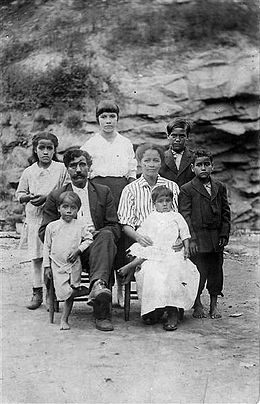
Back Melancan Azerbaijani Melungeon Welsh Melungeon German Melungeon Spanish Melungeons French Melungeon Italian Melungos Portuguese Меланджен Russian Meluncan Turkish 默伦琴人 Chinese
This article has multiple issues. Please help improve it or discuss these issues on the talk page. (Learn how and when to remove these template messages)
|
 Goins family, Melungeons from Graysville, Tennessee, c. 1920s | |
| Regions with significant populations | |
|---|---|
| United States (East Tennessee, Southwest Virginia,[1][2] North Carolina, and Kentucky[2]) | |
| Languages | |
| Southern American English | |
| Religion | |
| Protestant Christianity | |
| Related ethnic groups | |
| Lumbee, Atlantic Creole, Turks of South Carolina, Chestnut Ridge people, White Southerners, Black Southerners, Native Americans, Dominickers, Redbone (ethnicity), Mulatto |
| Part of a series on |
| African Americans |
|---|
Melungeons (/məˈlʌndʒənz/ mə-LUN-jənz) (sometimes also spelled Malungeans, Melangeans, Melungeans, Melungins[3]) are one of the many tri-racial isolate populations originating in colonial Virginia primarily descended from free people of color and white settlers.[4][5][6][7]
Some modern researchers believe that early Atlantic Creole slaves, descended from or acculturated by Iberian lançados[8] and Sephardi Jews fleeing the Inquisition,[9][10][11][12][13] were one of the pre-cursor populations to these groups.[14][15][16] Many creoles, once in British America, were able to obtain their freedom and many married into local white families.[17][18][19][20][21]
In the general U.S. census, Melungeon people were enumerated as of the races to which they most resembled.[22]
- ^ Cite error: The named reference
loller2was invoked but never defined (see the help page). - ^ a b Cite error: The named reference
nealwas invoked but never defined (see the help page). - ^ "1894 Report of the U.S. Department of the Interior, in its Report of Indians Taxed and Not Taxed" (PDF). www2.census.gov. Department of the Interior. Retrieved 12 June 2023.
- ^ "Melungeons | NCpedia". www.ncpedia.org. Retrieved 2024-05-23.
- ^ Schrift, Melissa (2013-04-01). "Becoming Melungeon". University of Nebraska Press: Sample Books and Chapters.
- ^ Press, The Associated Press | The Associated (2012-05-24). "DNA finds origin of Appalachia's Melungeons: African men, white women". The Denver Post. Retrieved 2024-05-23.
- ^ "Dancing Revolution: Bodies, Space, and Sound in American Cultural History 2018059613, 2019013274, 9780252051234, 9780252042393, 9780252084188". ebin.pub. 2021-07-11. Retrieved 2024-05-23.
- ^ Foner, Eric (8 June 2018). "Ira Berlin, 1941–2018". The Nation.
- ^ O'Neill, Brian Juan (2017). "Review of Creole Societies in the Portuguese Colonial Empire, Havik, Philip J., and Malyn Newitt, eds". Africa Today. 63 (4): 84–90. doi:10.2979/africatoday.63.4.05. hdl:10071/14918. JSTOR 10.2979/africatoday.63.4.05.
- ^ "African blacks and Mulattos in the 17th-Century Amsterdam Portuguese Jewish community". www.asser.nl. Retrieved 2024-05-27.
- ^ Mark, Peter; Horta, José da Silva (2013). The Forgotten Diaspora: Jewish Communities in West Africa and the Making of the Atlantic World. Cambridge University Press. ISBN 978-1-107-66746-4.[page needed]
- ^ Schorsch, Jonathan (2019). "Revisiting Blackness, Slavery, and Jewishness in the Early Modern Sephardic Atlantic". A Letter's Importance: The Spelling of Daka(h) (Deut. 23:2) and the Broadening of Western Sephardic Rabbinic Culture. doi:10.1163/9789004392489_022. ISBN 978-90-04-39248-9.
- ^ Kananoja, Kalle (2013). Mariana Pequena, a black Angolan jew in early eighteenth-century Rio de Janeiro (Report). hdl:1814/27607.
- ^ Mozingo, Joe (2012). The Fiddler on Pantico Run: An African Warrior, His White Descendants, A Search for Family. Simon and Schuster. ISBN 978-1-4516-2761-9.[page needed]
- ^ Berlin, Ira (1996). "From Creole to African: Atlantic Creoles and the Origins of African- American Society in Mainland North America". The William and Mary Quarterly. 53 (2): 251–288. doi:10.2307/2947401. JSTOR 2947401.
- ^ Bartl, Renate (2018). American tri-racials: African-Native contact, multi-ethnic Native American Nations, and the ethnogenesis of tri-racial groups in North America (Thesis). Ludwig-Maximilians-Universität München. doi:10.5282/edoc.26874.
- ^ Berlin, Ira (2017). "From Creole to African: Atlantic Creoles and the Origins of African-American Society in Mainland North America". Critical Readings on Global Slavery (4 vols.). pp. 1216–1262. doi:10.1163/9789004346611_039. ISBN 978-90-04-34661-1.
- ^ "The Anti-Amalgamation Law is Passed". African American Registry. Retrieved 2024-05-27.
- ^ Wolfe, Brendan. "Free Blacks in Colonial Virginia". Encyclopedia Virginia. Retrieved 2024-05-27.
- ^ "Introduction to Free African Americans of North Carolina, Virginia, and South Carolina". freeafricanamericans.com. Retrieved 2024-05-27.
- ^ Dodge, David (January 1886). "The Free Negroes of North Carolina". The Atlantic.
- ^ "1894 Report of the U.S. Department of the Interior, in its Report of Indians Taxed and Not Taxed" (PDF). www2.census.gov. Department of the Interior. Retrieved 4 Sep 2023.
© MMXXIII Rich X Search. We shall prevail. All rights reserved. Rich X Search